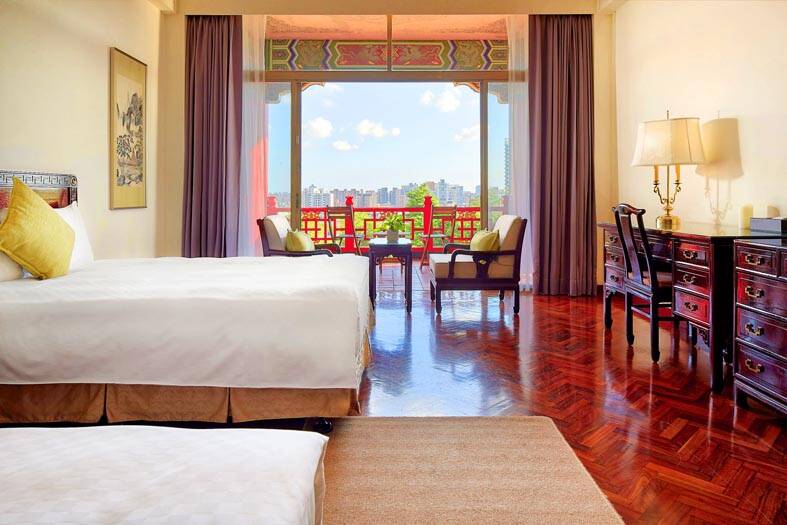From 2025, hotels in Taiwan would be restricted from supplying single-use toiletries unless they are specifically requested, the Environmental Protection Administration (EPA) said on Monday.
Under the new guidelines, which the EPA announced on its Web site, liquid toiletries such as shampoo, conditioner, shower gel and lotion would have to be provided in bottles with a volume of at least 180ml.
Meanwhile, disposable items such as combs, razors, toothbrushes, toothpaste and shower caps would no longer be offered in guests’ rooms, although hotels would be allowed to provide them on request, the EPA said.

Photo courtesy of the Kaohsiung Tourism Bureau via CNA
The regulations would not apply to hotel facilities outside of guest rooms, such as spas or swimming pools, the agency said.
The EPA reviewed the new regulations in January and initially said that stage one of the plan would be implemented on July 1, which did not happen.
The implementation date was changed to Jan. 1, 2025, to give the estimated 14,500 affected hotels, bed and breakfast facilities and catered campsites enough time to adapt, Wang Yueh-pin (王嶽斌), executive secretary of the EPA’s Recycling Fund Management Board, said in an interview on Monday.
By mandating the use of larger, reusable bottles for toiletries in hotels, the EPA estimated that plastic waste from smaller, disposable bottles could be cut by about 2,100 tonnes per year.
Hotels found contravening the rules would face a fine of NT$1,200 to NT$6,000, with the possibility of further penalties if no improvements are made, the EPA said.

Several Chinese Nationalist Party (KMT) officials including Chairman Eric Chu (朱立倫) are to be summoned for questioning and then transferred to prosecutors for holding an illegal assembly in Taipei last night, the Taipei Police said today. Chu and two others hosted an illegal assembly and are to be requested to explain their actions, the Taipei City Police Department's Zhongzheng (中正) First Precinct said, referring to a protest held after Huang Lu Chin-ju (黃呂錦茹), KMT Taipei's chapter director, and several other KMT staffers were questioned for alleged signature forgery in recall petitions against Democratic Progressive Party (DPP) legislators. Taipei prosecutors had filed

Taiwan would welcome the return of Honduras as a diplomatic ally if its next president decides to make such a move, Minister of Foreign Affairs Lin Chia-lung (林佳龍) said yesterday. “Of course, we would welcome Honduras if they want to restore diplomatic ties with Taiwan after their elections,” Lin said at a meeting of the legislature’s Foreign Affairs and National Defense Committee, when asked to comment on statements made by two of the three Honduran presidential candidates during the presidential campaign in the Central American country. Taiwan is paying close attention to the region as a whole in the wake of a

President William Lai (賴清德) has appointed former vice president Chen Chien-jen (陳建仁) to attend the late Pope Francis’ funeral at the Vatican City on Saturday on his behalf, the Ministry of Foreign Affairs said today. The Holy See announced Francis’ funeral would take place on Saturday at 10am in St Peter’s Square. The ministry expressed condolences over Francis’ passing and said that Chen would represent Taiwan at the funeral and offer condolences in person. Taiwan and the Vatican have a long-standing and close diplomatic relationship, the ministry said. Both sides agreed to have Chen represent Taiwan at the funeral, given his Catholic identity and

Lawmakers from the Democratic Progressive Party (DPP) yesterday established a friendship group with their counterparts in Ukraine to promote parliamentary exchanges between the two countries. A ceremony in Taipei for the Taiwan-Ukraine Parliamentary Friendship Association, initiated by DPP Legislator Chen Kuan-ting (陳冠廷), was attended by lawmakers and officials, including Deputy Minister of Foreign Affairs Francois Wu (吳志中) and European Economic and Trade Office in Taiwan Director Lutz Gullner. The increasingly dire situation in Ukraine is a global concern, and Taiwan cannot turn its back when the latter is in need of help, as the two countries share many common values and interests,